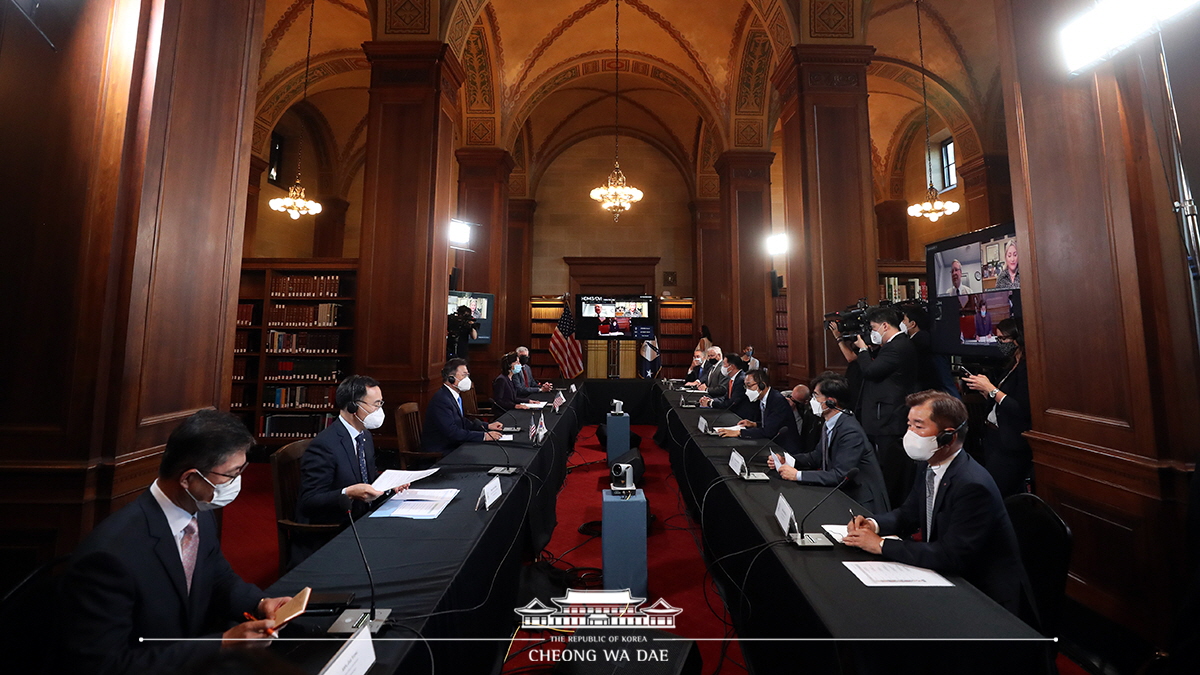이 웹사이트는 제19대 대통령 임기 종료에 따라 대통령기록관이 「대통령기록물 관리에 관한 법률」에 의해 이관받아 서비스하는 대통령기록물입니다. 자료의 열람만 가능하며 수정 · 추가 · 삭제는 불가능합니다.
다만, 「개인정보보호법」에 의하여 개인의 정보를 보호받기 원하시는 분은 관련 내용(요청자, 요청내용, 연락처, 글위치)을 대통령 웹기록물 담당자(044-211-2253)에게 요청해 주시면 신속히 검토하여 조치해 드리겠습니다. 감사합니다.
SPEECHES & REMARKS
BRIEFINGS

I am grateful to U.S. Secretary of Commerce Gina Raimondo for arranging this invaluable meeting. Leaders from America’s cutting-edge businesses and Korea’s global manufacturers have been brought together. Just seeing you here brings new hope. In the same way that friendship shines even brighter in times of trouble, I expect that our meeting today will mark the beginning of a brighter future.
Based on our robust alliance that dates back 70 years, the United States and the Republic of Korea have worked closely together in the economic and industrial sectors as well. Despite the COVID-19 crisis, trade between our two countries has remained steadfast. Bilateral trade has increased over 10 percent this year, adding vitality to both of our economies as they recover the fastest from the COVID-19 crisis.
The United States and Korea are each other’s most important investment partners. As of last year, 27 percent of Korean businesses’ overseas investments went to the United States, and 25 percent of inbound investments in Korea came from American companies. Recently, Hyundai Motor Company announced its plan to invest US$7.4 billion in the United States to build an electric vehicle manufacturing plant. Vibrant investments between our two countries will play a great role in advancing new industries and creating jobs.
Recently, the COVID-19 crisis has exposed vulnerabilities in global supply chains. More stable supply chains are needed, and economic cooperation between our two countries – which have complementary industrial structures – has become all the more important. The areas where the greatest synergy is expected are the semiconductor, battery and biohealth industries. American businesses lead the global market in such cutting-edge areas as semiconductor design, AI, big data and future cars while Korean companies have unmatched technological prowess and production capabilities with semiconductors and with batteries – the core technology of the low carbon economy.
Today, I am pleased that our two countries agreed to strengthen our semiconductor supply chain cooperation based on our complementary structures. Samsung Electronics will invest US$17 billion to build a new semiconductor plant in the United States, and SK Hynix will construct a new R&D center in Silicon Valley. DuPont, a world-class U.S. chemical company, will establish an R&D center for advanced semiconductor materials in Korea, which will help further strengthen our country’s semiconductor supply chain. In the battery sector, SK and LG have also recently invested US$4.3 billion in facilities in the United States. The two businesses are also pushing for additional investments worth US$14 billion through sole or joint investments with U.S. automakers. They are all world-class companies.
If Korea and the United States join forces in this way, U.S. companies will be able to secure a stable supply chain for parts and Korean businesses will grow in tandem as they open up a broader market. Korean businesses have the world’s second largest biopharmaceutical production capacity. They and the U.S. companies that have led development of COVID-19 vaccines will become the optimal partners to accelerate global vaccine supplies. The governments of our two countries also agreed to make joint efforts to support these companies’ investments.
Today’s meeting will revitalize not only our two countries’ economies but also the global economy. I hope that cooperation between our businesses and governments will be further strengthened across industries and the economy. I look forward to seeing our two countries’ economies make a bigger leap forward together and usher in a mutually beneficial tomorrow.
Thank you.



